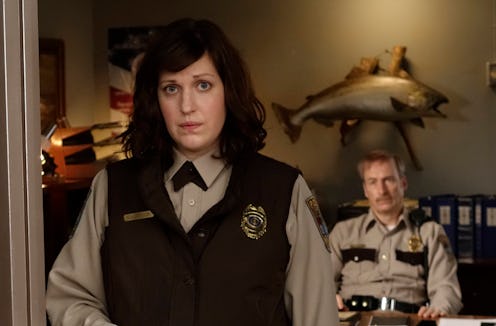
Breaking Bad did a great deal for the world of television. It gave us a new realm of possibility in plot, protagonists, and format. It highlighted the sexism rampant in the world of television drama. But it also delivered a very important piece of the new TV world order: The notion that quality over quantity can and does exist. After all, we've got Breaking Bad, True Detective, and now FX's Coen Brothers-inspired Fargo as proof that when you do something right, you don't have to milk it until it's got nothing left to give. And while the AMC and HBO series mostly leaned on male protagonists, Fargo brings women into this new realm with the help of one Molly Solverson, uber-determined detective extraordinaire.
In the Season 1 finale, Molly is the only person left standing. Her ex-cop husband Gus (Colin Hanks) kills Lorne Malvo (Billy Bob Thorton) with more than a handful of bullets to the chest and face after Lester weakens Malvo with a bear trap; Lester Nygaard gets what's coming to him when he falls through thin ice while evading the police; FBI's "finest" agents Budge and Pepper (Jordan Peele and Keegan-Michael Key) are frozen corpses behind a pile of firewood; and Chief Bill (Bob Odenkirk) steps down from his post, leaving it primed and ready for Molly. The only person left actually standing tall is the newly named Chief Solverson and while it's unlikely she'll have to wield her incredible crime-solving skills in a small town like Bemidji ever again, it's her skill and her wits that got her there.
As she sits between Gus and her step daughter Greta in the final moments of Fargo's first season, Molly puts her hand comfortingly on Gus' leg while Greta rests her head on Molly's shoulder. Fargo is coming to a close and we're not being scintillated by Lester's delusion or Malvo's seeming invincibility. Instead, we're finding Molly in her new, powerful role. Molly is sitting slightly forward and slightly taller than her loving, worrying husband, suggesting that she is the clear victor and leader left standing after all the carnage throughout Fargo's 10 episodes and bringing her into the leagues of heroes like Matthew McConaughey's Rust Cohle and Woody Harrelson's Marty Hart.
In that moment, Molly becomes part of the faction of protagonists of series like Breaking Bad and True Detective, where letting the story end when it makes sense for the characters rather than for the network's bottom line is not only a possibility, but the norm. Thanks to this growing mentality in TV production (and at the executive level) we'll never see Walter White being taken through some red herring of a scenario so that his journey can stretch for one more season of AMC ad revenue. True Detective isn't bringing back the philosophical rantings of Rust Cohle, no matter how much chatter they inspired. And Fargo isn't going to drag Molly Solverson into another unbelievable crime solving adventure if showrunner Noah Hawley has anything to say about it. These characters will all enjoy the privilege of their stories having ended as they should and at a time that made narrative sense, and thanks to Fargo, that privilege is no longer a male-protagonist-specific option.
Images: FX